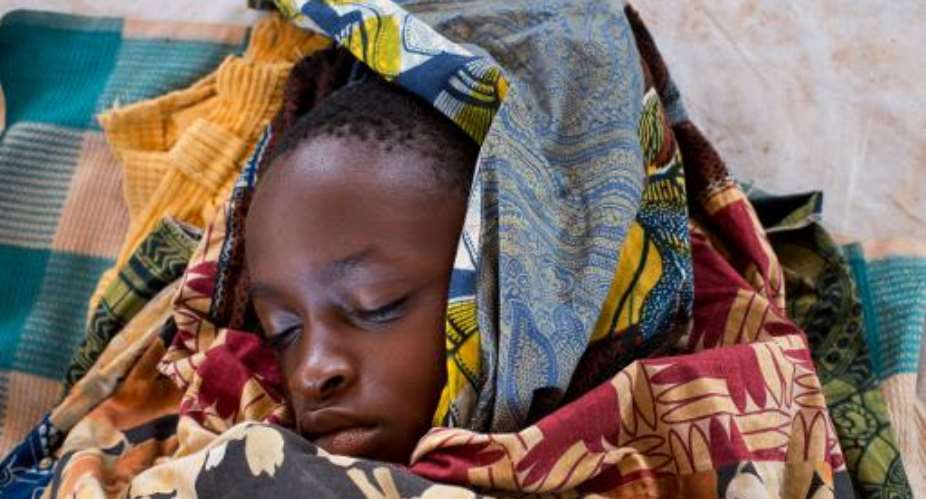Geneva (AFP) - Medical charity Medecins sans Frontieres (MSF, Doctors Without Borders) said Sunday it had launched emergency treatment centres in Tanzania, where thousands of Burundians fleeing unrest have been hit by cholera.
"The situation is critical," said Nanan Kassi N'Zeth, the MSF coordinator.
"The refugees are confronted with an impossible choice at the moment: to remain in Burundi and face insecurity or seek refuge in Tanzania and risk cholera."
The UN said some 3,000 cases of cholera have been reported in Tanzania, mainly among Burundian refugees, with up to 400 new cases counted daily.
So far, 31 people have died of the water-borne disease in the area around the western Tanzanian border town Kagunga, which has been flooded with refugees, according to the UN refugee agency.
All but two of those who have died were Burundian refugees, and most were children, it said.
MSF said it had set up, along with health authorities, cholera treatment centres in refugee camps in Kagunga and Kigoma.
In Kigoma, located on the shores of Lake Tanganyika near the frontier with Burundi, about 2,000 people had been crammed into a football stadium which was serving as a transit centre before they are sent to refugee camps, MSF said, adding that nearly 1,000 cases of diarrhoea had been reported here in the past week.
Another transit site in Kagunga -- about four hours by boat from Kigoma -- sheltered 15,000 refugees. Many cholera patients had died while being transported by boat for medical treatment in Kigoma, he added.
"The medical services here are extremely limited and receive 200 patients a day on average," said Kassi, adding that many refugees were forced to sleep in the open or construct their own makeshift shelters.
Poor sanitation, a lack of latrines and poor hygiene were exacerbating the situation, Kassi said.
MSF said it had sent a plane carrying medicines, equipment and extra teams to cope with the crisis.
Cholera is transmitted through contaminated drinking water, and UNHCR said overcrowding, unsanitary conditions as well as the consumption of water directly from the lake were believed to have sparked the outbreak.
The agency and its partners are struggling to move refugees from overcrowded Kagunga, situated on a narrow peninsula surrounded by a steep mountain range, to the western province of Kigoma.
Since early April, more than 100,000 people have fled to neighbouring countries -- mainly to Tanzania -- from Burundi due to political violence sparked by the country's president to seek a controversial third term.





 There’s nothing you can do for us; just give us electricity to save our collapsi...
There’s nothing you can do for us; just give us electricity to save our collapsi...
 Ghanaian media failing in watchdog duties — Sulemana Braimah
Ghanaian media failing in watchdog duties — Sulemana Braimah
 On any scale, Mahama can't match Bawumia — NPP Youth Organiser
On any scale, Mahama can't match Bawumia — NPP Youth Organiser
 Never tag me as an NPP pastor; I'm 'pained' the 'Akyem Mafia' are still in charg...
Never tag me as an NPP pastor; I'm 'pained' the 'Akyem Mafia' are still in charg...
 Your refusal to dedicate a project to Atta Mills means you never loved him — Kok...
Your refusal to dedicate a project to Atta Mills means you never loved him — Kok...
 2024 elections: I'm competent, not just a dreamer; vote for me — Alan
2024 elections: I'm competent, not just a dreamer; vote for me — Alan
 2024 elections: Forget NPP, NDC; I've the Holy Spirit backing me and nothing wil...
2024 elections: Forget NPP, NDC; I've the Holy Spirit backing me and nothing wil...
 2024 elections: We've no trust in judiciary; we'll ensure ballots are well secur...
2024 elections: We've no trust in judiciary; we'll ensure ballots are well secur...
 Performance tracker: Fire MCEs, DCEs who document Mahama's projects; they're not...
Performance tracker: Fire MCEs, DCEs who document Mahama's projects; they're not...
 Train crash: Railway ministry shares footage of incident
Train crash: Railway ministry shares footage of incident
